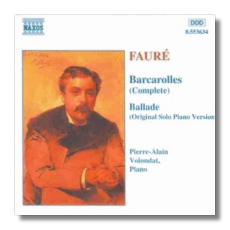
The Internet's Premier Classical Music Source
Related Links
- Fauré Reviews
- Latest Reviews
- More Reviews
-
By Composer
-
Collections
DVD & Blu-ray
Books
Concert Reviews
Articles/Interviews
Software
Audio
Search Amazon
Recommended Links
Site News
 CD Review
CD Review
Gabriel Fauré

Ballade & Barcarolles
- Ballade in F Sharp Major, Op. 19 (1879)
- Barcarolle #1 in A minor, Op. 26 (1880)
- Barcarolle #2 in G Major, Op. 41 (1885)
- Barcarolle #3 in G Flat Major, Op. 42 (1885)
- Barcarolle #4 in A Flat Major, Op. 44 (1886)
- Barcarolle #5 in F Sharp minor, Op. 66 (1894)
- Barcarolle #6 in E Flat Major, Op. 70 (1896)
- Barcarolle #7 in D minor, Op. 90 (1905)
- Barcarolle #8 in D Flat Major, Op. 96 (1906)
- Barcarolle #9 in A minor, Op. 101 (1909)
- Barcarolle #10 in A minor, Op. 104/2 (1913)
- Barcarolle #11 in G minor, Op. 105 (1913)
- Barcarolle #12 in E Flat Major, Op. 106bis (1915)
- Barcarolle #13 in C Major, Op. 116 (1921)
Pierre-Alain Volondat, piano
Naxos 8.553634 - 77min
I can't think of a more difficult program for a pianist than all the Fauré barcarolles at once. The composer himself didn't think of them as a group and produced them throughout his career - the first some time before 1882, the last in 1921. They all inhabit pretty much the same emotional climate and present mostly a smooth surface with a dark undercurrent that only occasionally breaks into passionate singing. The group challenges a player to become a master of color, not only to bring out the disturbances of subsidiary lines, but to hold interest. Volondat unfortunately fails to meet the music's demands time after time. His tone really doesn't vary; he merely gets louder or softer. Furthermore, in the first barcarolle, Op. 26, he cuts off the first section from the second for no apparent reason (at first I thought he had finished). In the second, Op. 41, a light beginning suddenly bursts with a rare excursion by the composer into a full-blooded Romanticism. For once, he's not dealing in pastels. Volondat treats it like knock-off Chopin. Fauré demands great imagination from his interpreters. The music doesn't "play itself," as, say, some of Debussy's or even some of Chopin's does. Volondat sounds as if he just doesn't want to get involved. Under his fingers, the music lacks a pulse.
The solo version of the Ballade, the original, is much closer to other Romantic piano music than to what think of as idiosyncratic Fauré. Volondat does better, but even here, he fails to convey the architecture of the piece. The performance tends to break apart like tangerine sections. He does better in faster passages than in the ruminative ones, where he sounds like he's on automatic.
The recorded sound doesn't help. It muffles the instrument. This is one of the worst-sounding piano CDs I've heard in a while.
Copyright © 1996, Steve Schwartz


















